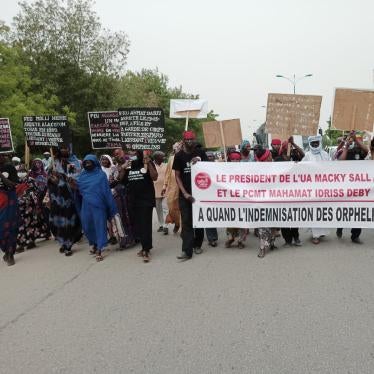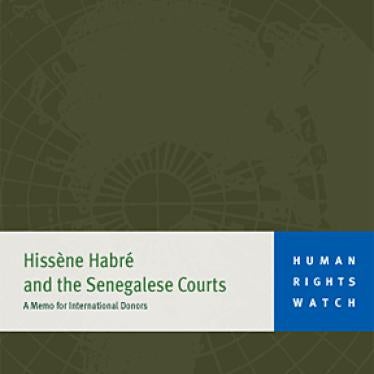(Addis Ababa) – More than 30 months after it asked Senegal to prosecute the former dictator of Chad, Hissène Habré, the African Union should ensure that the trial moves forward, five African and international human rights groups said today. African heads of state will come together in Addis on Sunday, February 1 for an AU summit.
At a summit meeting on July 2, 2006, the AU mandated Senegal, “to prosecute and ensure that Hissène Habré is tried, on behalf of Africa,” and called on the AU Commission, “to provide Senegal with the necessary assistance for the effective conduct of the trial.” Habré is living in exile in Senegal.
But Senegal has taken no action and the AU has given it no support, said a joint statement by the Chadian Association for the Promotion and Defense of Human Rights (ATPDH), the Chadian Association of Victims of Political Repression and Crime (AVCRP), the African Assembly for the Defense of Human Rights (RADDHO), Human Rights Watch, and the International Federation of Human Rights (FIDH).
“We expect the African Union to respect its commitment to see that this prosecution moves forward,” said Dobian Assingar of the FIDH, who is also honorary president of the Chadian League for Human Rights. “The AU’s credibility is on the line. Both Senegal and the AU have just stalled and stalled.”
Habré ruled Chad from 1982 until he was deposed in 1990 by President Idriss Déby Itno and fled to Senegal. His one-party regime was marked by widespread atrocities, including waves of ethnic campaigns. Files of Habré’s political police, the DDS (Direction de la Documentation et de la Sécurité), which were discovered by Human Rights Watch in 2001 (https://www.hrw.org/justice/habre/habre-police.htm), reveal the names of 1,208 persons who were killed or died in detention. A total of 12,321 victims of human rights violations were mentioned in the files.
Faced with Senegal’s inaction, on September 16, 2008, 14 victims filed new complaints with a Senegalese prosecutor, accusing Habré of crimes against humanity and torture. The authorities have said they will take no action on the complaints, however, until they receive full international funding for all the costs of the trial, which Senegal puts at €27.4 million.
The rights groups note that such trials are usually funded year-by-year and the European Commission has already offered €2 million for the first stages of the investigation, but is waiting for Senegal to present a budget. Chad has offered €3 million. Belgium, France, the Netherlands and Switzerland have also agreed to help finance the trial. The African Union, however, has offered no assistance.
“The African Union and Sénégal risk being seen as accomplices in Hissène Habré’s efforts to escape punishment,” said Jacqueline Moudeina, the victims’ Chadian lawyer and president of the ATPDH. “This is a shame on Africa. We are still at point zero. Does the political will exist to bring Hissène Habré to justice?”
Speaking for the victims, Souleymane Guengueng, founder of the AVCRP, said: “First we were tortured by Habré’s dictatorship and now for 18 years we have been mocked by Senegalese and African leaders who refuse to hear our pleas for justice. Unless Senegal and the AU act soon, there won’t be any victims left at the trial.” Guengueng almost died of dengue fever during almost three years of mistreatment in Chadian prisons.
“The African Union gets upset when Africans face international criminal justice, but the real problem is that justice in Africa is totally powerless in the face of the crimes committed by African leaders,” said Alioune Tine, president of the Dakar-based RADDHO. “The Habré trial should be a precedent to show that African courts can deliver independent, fair, and effective justice for crimes committed in Africa.”
The five human rights groups urged the African Union to:
- Press Senegal to keep its commitment to try Habré;
- Provide Senegal with the necessary assistance for the effective conduct of the trial;
- Appeal to AU member states to assist Senegal; and
- Define the mandate of its special envoy to coordinate and promote financial and technical assistance to Senegal and send him to Dakar as soon as possible.
Background
Habré was first indicted in Senegal in 2000, but then Senegalese courts ruled that he could not be tried there for crimes committed in Chad. His victims then turned to Belgium and, after a four-year investigation, a Belgian judge in September 2005 charged Habré with crimes against humanity, war crimes, and torture.
Following a Belgian extradition request, Senegalese authorities arrested Habré in November 2005. The Senegalese government then asked the African Union to recommend how to try Habré. On July 2, 2006, the African Union, following the recommendation of a Committee of Eminent African Jurists, called on Senegal to prosecute Habré “in the name of Africa,” and Senegalese President Abdoulaye Wade declared that Dakar would do so.







